I wasn’t suicidal, but I was curious what would happen. Surely, the app bought by $10 billion dollar company Twitter had thought of this use case. I imagined a window would pop up, advising me who to call if I needed help, but no, the post went through.
Instantly, fifty people had joined to watch, compared to my normal two or three. Some anonymous viewers messaged homophobic slurs and goaded me on to suicide, but it wasn’t all bad. Concerned people asked if I was okay. Others told me what I was doing was a horrible irresponsible joke, and one person shared a story about how upsetting my post was as her father had committed suicide on the exact same day a year before.
I felt bad about what I had done, but still felt periscope’s system should be better.
Then, three months ago, a French 19-year-old, did it for real. Again goaded on by users.
While people on the internet may be guilty of ignoring mental illness and victimizing vulnerable, unstable people, social media companies are the true culprits, ignoring these problems on their networks. We won’t be able to tame the crowds and trolls of the Internet any time soon, but these companies can easily make small changes that have enormous impacts across their huge networks, yet they don’t.
We already have Big Brother, he just only cares about advertising
You might ask, wouldn’t monitoring social media sites for mental illness violate privacy, isn’t it a bit creepy? Social media companies like Facebook already track our every action.We screen posts for nipples, obscenity, hate speech, piracy, scams. We measure and quantify and cluster, to maximize ad targeting. Why not also screen to improve mental health?
They’ve detect the emotional valence of Facebook posts[1] so why aren’t they using this tool to screen for depression or mania? A friend told me in a manic phase he liked so many Facebook groups so quickly that Facebook thought he was a bot and locked the function on his account. Why didn’t it also gently suggest he might be having a mental health problem and nudge him towards getting help?
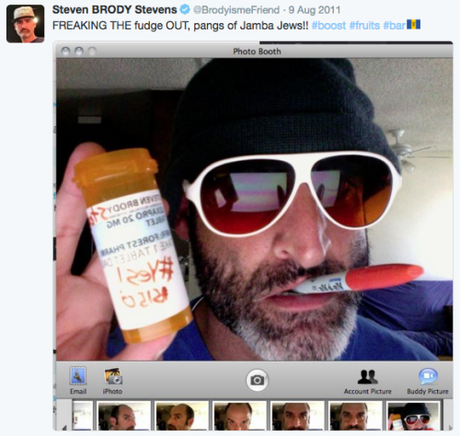
Public Twitter Meltdowns
Social media has raised awareness of mental illness, by pushing celebrities erratic behavior into the limelight. In 2011, hangover actor Brody Stephens, experienced his first manic episode and before becoming aware of the condition, essentially live-tweeteed the whole experience. Even completely ignoring the bizarre content of the tweets, can you guess where the manic episode occurred, by looking at the numbers of tweets posted?
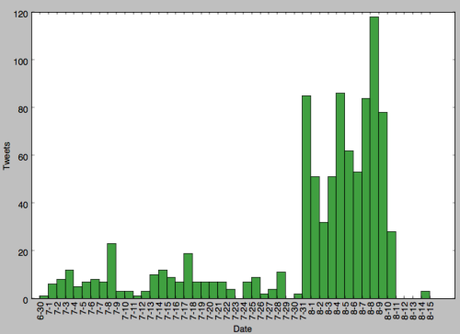
But in addition to changes in quantity, and timing of posts, the words themselves are smoking guns. Deleted tweets from this time period, reportedly included: “I’m off Lexapro & I have a gun in my mouth! Do you believe me? #trust #me & #magnets – #5150 on roof, ok? #PositveConnection #belief #daisy”.
Brody later spoke about this period on the podcast Mental Illness Happy Hour:
“Paul: And are you sleeping at this point?
Brody: Not much. Like four hours. And people think I’m up all night. I’m tweeting up a storm, I’m just going nuts on Twitter, so that’s why people know like something’s not right with Brody. Is it a bit for his HBO thing? Is it real? And then I mentioned something about a gun and that’s when like—that caught the eye of a lot of people. That scared people.
Paul: What did you say?
Brody: I said I had a gun, back off, leave me alone, I got a gun. Somebody said I may have said I have a gun in my mouth. I don’t know. But I didn’t have a gun. I didn’t want to hurt myself.
Paul: But you tweeted that …
Brody: I tweeted that because I was getting these calls from all of my friends worried about me. I was like, “I’m fine. Guys, I’m fine. Trust me. I’m happy.” I was out of character, you know…”
~ Excerpt from Mental Illness Happy Hour’s interview with Brody Stevens
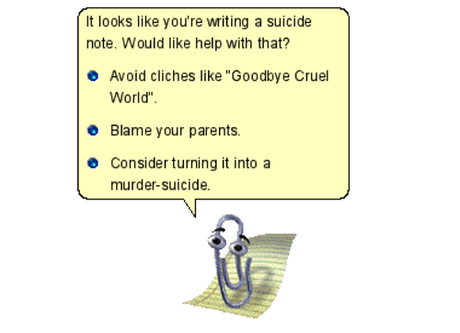
The person behind the words – How good does a screening tool have to be?
Brody Stevens’ tweeted about having a gun in his mouth, but he didn’t even own a gun, and later claimed to be joking. Though he was mentally ill and in need of help at that time, it also illustrates one of the potential problems with screening for mental illness over the Internet–It’s hard to tell whether someone is telling the truth or joking. At the time of Brody’s meltdown many people thought it was a publicity stunt or even Kaffman-esque avant-garde comedy. Reading the posts in context is hard enough for humans, let alone for a computer algorithm.
A related story, told in the documentary Terms and Conditions May Apply is of a man repeatedly googleing topics like “how to murder cheating wife.” Someone who an algorithm should flag to be checked up on, right? Turns out he’s a writer for Cold Case investing a story. The google searches I made to write this article are similarly damning.
Obviously we don’t want to diagnose or arrest someone based on circumstantial evidence, but the algorithms don’t have to be perfect to be valuable as screening tools. If the algorithm says someone is likely of suffering from a problem, the system can gently and unobtrusively offer help:
“We noticed some frightening words in your post. If you are experiencing distress or need to talk to someone please call this hot-line for help: 555-5555. Click here to ignore this message and others like it.”
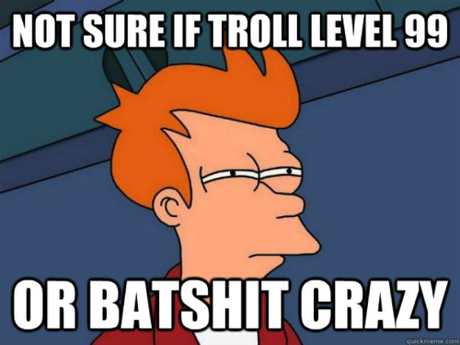
The other person behind the words – taking seriously the deranged
Conversely, in real life, we use many non-verbal cues to assess someone’s mental state, walking down a city street if someone approaches you with a question, you’ll probably instantly assess:
- Are they disheveled or well groomed,
- Do they make normal eye contact,
- What is their emotional state,
- Are they speaking at a normal speed with typical inflection,
- Do they appear to be on drugs?
But none of these factors are available on the Internet. Because of this, on the Internet, people in altered states actions can go unchecked and be misinterpreted. Add to this fire the blazing speed of the internet and people quickly make a series of mistakes: reckless purchases that racking up credit card debt, emailing a psychotic rant to their entire address book, etc.
We may take seriously, or attach judgments to people’s actions, where if we saw them in real life, we would realize the state they are in and respond to their actions in a very different way.
What is being done now?
Shockingly little. For example, if I google ‘flu symptoms,’ hell if I misspell it and google ‘flue symptoms,’ google feeds me a featured snippet about the influenza:
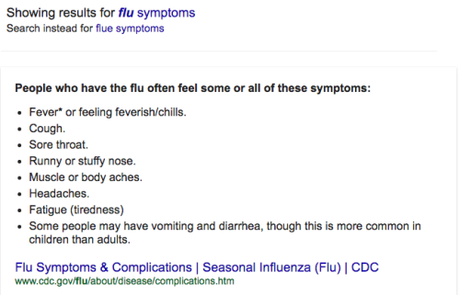
But if I search ‘how to commit suicide’ there’s no curated content, it just feeds me the top websites with suicide information:
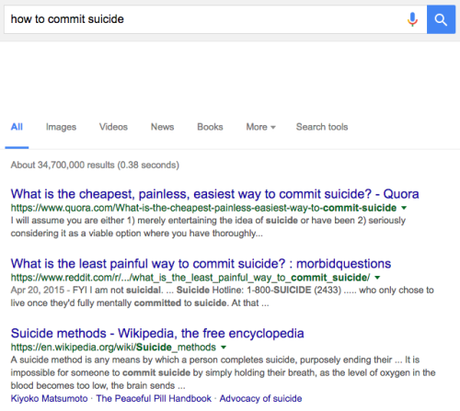
Luckily users on Quora and Reddit have taken it upon themselves to share suicide prevention information (though it is not universal information and google could feed the correct information based on people’s location), but we shouldn’t rely on the benevolence of strangers on the internet, we should make sure that access to care is given to people at these crucial junctures.
Research into these sorts of issues is starting to get funded. Earlier in 2016, University of Ottawa’s Diana Inkpen was granted $464,100 for “social web mining and sentiment analysis for mental illness detection.” Such research is part of the growing field of Cyberpsychology, which essentially studies both how psychology influence behavior on computers and online networks, and also how these interactions co back to influence an individual’s psychology.
Already research into social networks have built algorithms that say a lot about the individual: “By looking at your Facebook profile or your Twitter feed, we can very accurately predict very intimate traits that you may not be aware you’re revealing,” said Stanford University’s Michal Kosinski to CBC Canada. By looking at facebook profiles and friend networks, his lab’s algorithm’s can predict sexual orientation, IQ, as well as political and religious identification[2].
My impression is that a lot of cyberpsychology research that overlaps with psychiatry so far has focused on the prevalence of internet addiction and it’s relationship with depression, but that’s only the tip of the iceberg. There’s a long way to go.
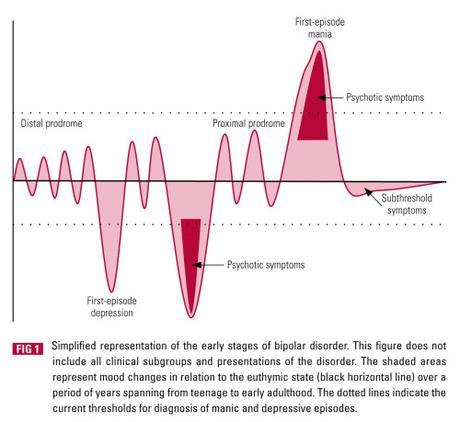
source: Ejalinthara et al., 2010
Detecting relapse
At the very least, we should be able to opt into service that can detect relapses of mental illness. Mental illnesses such as bipolar disorder, depression, and schizophrenia can have periodic natures, with stretches of relatively normal mood and mindset and then abrupt changes into mental illness. Sometimes this includes severe psychosis, with a loss of rationally thinking that can be extremely dangerous, and prevent the sufferer from recognizing his/her own condition.
Voluntary opt-in service that would monitor patient’s social network activity and alert them, and/or their friends and family to abrupt changes in behavior. Perhaps with sophisticated algorithms we could even detect disorders in pro-dromal stages of the disease, when there are symptoms but it is not yet disruptive, such as the hypomania that can precede manic psychosis.
Final Conclusion
I’m sure other people have written about this before but it was hard for me to find in my searches, so if you know about this topic please let me know it really fascinates me.
For example:
- Do you know of any interesting stories related to this topic you could send my way?
- Have you or friends had personal experiences with mental illness that manifested in a strange way through the internet?
- Do you have your own ideas about how to screen for mental illness?
- Or do you believe strongly it’s unethical to screen?
Finally, I researched and wrote this for free out of the goodness of my heart (and an insatiable need for the approval of strangers), so if you liked this article please share it, or follow me to get notified about future articles. And if you didn’t like the article, write a comment if you please about why it was a piece of shit.
Footnotes (Tangents/Bad Jokes)
[1] And could alter how often positive or negative posts were seen to manipulate our emotions.
[2] If I recall correctly, one of these studies showed that a Facebook interest in curly fries was the most correlated interest with having a high IQ.

